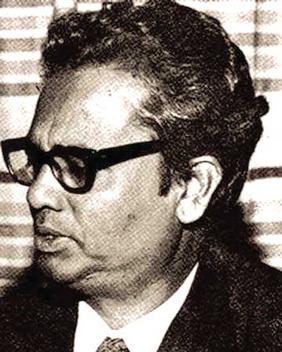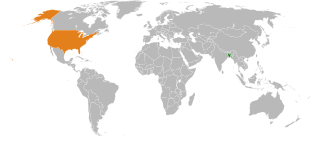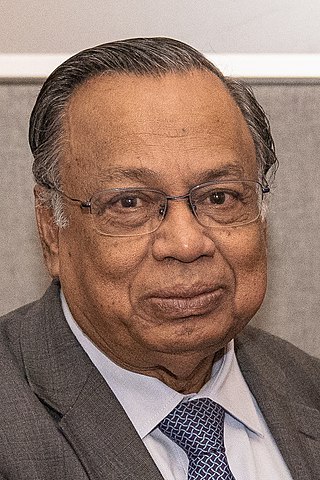
The United Nations (UN) is an intergovernmental organization whose stated purposes are to maintain international peace and security, develop friendly relations among nations, achieve international cooperation, and serve as a centre for harmonizing the actions of nations. It is the world's largest international organization. The UN is headquartered in New York City, and the UN has other offices in Geneva, Nairobi, Vienna, and The Hague, where the International Court of Justice is headquartered at the Peace Palace.

The Bangladesh Armed Forces are the combined military forces of the People's Republic of Bangladesh. It consists of the three uniformed military services: the Bangladesh Army, the Bangladesh Navy and the Bangladesh Air Force. The Armed Forces are under the jurisdiction of Ministry of Defence of the Government of Bangladesh, and is directly administered by the Armed Forces Division of the Prime Minister's Office. The President of Bangladesh serves as the Commander-in-Chief of the Bangladesh Armed Forces. It has the third-largest defence budget in South Asia and according to the Global Firepower index it is the third most powerful military force in South Asia. Border Guard Bangladesh and Bangladesh Coast Guard are under the jurisdiction of the Ministry of Home Affairs during peacetime, but during wartime they fall under the command of Bangladesh Army and Bangladesh Navy respectively.

The United Nations Human Rights Council (UNHRC) is a United Nations body whose mission is to promote and protect human rights around the world. The Council has 47 members elected for staggered three-year terms on a regional group basis. The headquarters of the Council are at the United Nations Office at Geneva in Switzerland.

The Bangladesh Liberation War was a revolution and armed conflict sparked by the rise of the Bengali nationalist and self-determination movement in East Pakistan, which resulted in the independence of Bangladesh. The war began when the Pakistani military junta based in West Pakistan—under the orders of Yahya Khan—launched Operation Searchlight against the people of East Pakistan on the night of 25 March 1971, initiating the Bangladesh genocide.

The United Nations Mission in Sierra Leone (UNAMSIL) was a United Nations peacekeeping operation in Sierra Leone from 1999 to 2006. It was created by the United Nations Security Council in October 1999 to help with the implementation of the Lomé Peace Accord, an agreement intended to end the Sierra Leonean civil war. UNAMSIL expanded in size several times in 2000 and 2001. It concluded its mandate at the end of 2005, the Security Council having declared that its mission was complete.
Canada was a founding member of the United Nations, and was an original signatory of the Declaration by United Nations. At the signing of the Declaration by United Nations, Canada was one of four Dominions of the British Empire present, alongside Australia, New Zealand, and the Union of South Africa. In 1945, Canada was present at the United Nations Conference on International Organization and signed the Charter of the United Nations. McGill University professor John Peters Humphrey was the principal author of the first draft of the Universal Declaration of Human Rights.

Munier Choudhury was a Bangladeshi educationist, playwright, literary critic and political dissident. He was a victim of the mass killing of Bangladeshi intellectuals in 1971. He was awarded Independence Day Award in 1980, by the then president Ziaur Rahman's government, posthumously.

Kamal Hossain is a Silent Generation founding leader, lawyer and politician of Bangladesh. He is known as the "father of the Bangladeshi constitution" and regarded as an icon of secular democracy in the Indian subcontinent. Hossain currently heads his own law firm in Dhaka. He retired from political activities and from the post of president of Gano Forum in October 2023.

Abu Sayeed Chowdhury was a jurist and the second president of Bangladesh. Besides that, he held the positions of the Chairmen of the United Nations Commission on Human rights, the vice-chancellor of the University of Dhaka, the Foreign Minister of Bangladesh and the first Bangladesh High Commissioner to the UK.

The United Nations Mission in Liberia (UNMIL) was a United Nations peacekeeping operation established in September 2003 to monitor a ceasefire agreement in Liberia following the resignation of President Charles Taylor and the conclusion of the Second Liberian Civil War (1999–2003). At its peak it consisted of up to 15,000 UN military personnel and 1,115 police officers, along with civilian political advisors and aid workers.

France has been a member of the United Nations (UN) since its foundation in 1945 and is one of the five countries, alongside China, Russia, the United Kingdom, and the United States, that holds a permanent seat on the United Nations Security Council (UNSC), which is responsible for maintaining international peace and security.

The Bangladesh Armed Forces and the Bangladesh Police have been actively involved in a number of United Nations Peace Support Operations (UNPSO) since 1988. Currently Bangladesh is the largest contributor in the UN peacekeeping missions.

Bangladesh-United States relations are the bilateral relations between the People's Republic of Bangladesh and the United States of America. For the United States, Bangladesh is the 38th largest goods supplier and 60th largest export market. For Bangladesh, the United States is the largest export market. The two countries signed a bilateral investment treaty in 1986. U.S. companies are the largest foreign investors in Bangladesh. The U.S. government is the leading contributor of humanitarian assistance in response to the Rohingya crisis. Both nations have announced similar views for a Free and Open Indo-Pacific. Bangladesh has nurtured amicable relationships with all nations, prioritizing the enhancement of the socio-economic well-being of its people.
Shah Abu Muhammad Shamsul Kibria, known as SAMS Kibria or Shams Kibria, was a Bangladeshi economist, diplomat and politician.
India was among the charter members of the United Nations that signed the Declaration by United Nations at Washington, D.C., on 1 January 1942 and also participated in the United Nations Conference on International Organization at San Francisco from 25 April to 26 June 1945. As a founding member of the United Nations, India strongly supports the purposes and principles of the UN and has made significant contributions in implementing the goals of the Charter, and the evolution of the UN's specialised programmes and agencies.

Abul Hassan Mahmood Ali is the current finance minister of Bangladesh who also served as parliamentarian and cabinet minister including the Foreign Minister of Bangladesh from 2013 to 2019. He previously served as Minister of Disaster Management and Relief from 2012 to 2013.
Malaysia became the 82nd member of the United Nations on 17 September 1957. Malaysia has held a rotational non-permanent seat on the United Nations Security Council for four terms, and has participated in over 30 United Nations peacekeeping missions since October 1960.

Abul Kalam Abdul Momen, known as AK Abdul Momen, is a Bangladeshi economist, diplomat, and politician who served as Minister of Foreign Affairs of Bangladesh from January 2019 to January 2024. He served as Permanent Representative of Bangladesh to the United Nations from August 2009 until October 2015. He was elected a member of Jatiya Sangsad from the Sylhet-1 constituency at the 2018 general elections. Following his election, he was appointed the minister of foreign affairs by the Prime Minister Sheikh Hasina.
The People's Socialist Republic of Albania joined the United Nations on 14 December 1955, and has participated in several UN peacekeeping operations. The current Representative of Albania in the UN is Mr. Ferit Hoxha. Albania is a non-permanent member of the 15-country UN Security Council for the two-year term (2022–2023).

The Permanent Mission of Mexico to the United Nations is the diplomatic mission of Mexico to the United Nations in New York. The Mission is represented by the Permanent Representative. The current Mexican Permanent Representative to the United Nations is Juan Ramón de la Fuente.




















